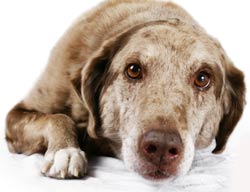 No pet owner wants their best friend to get older. For most of us, our pets are truly four-legged family members, and as they enter their golden years, we’re faced with the fact that sadly, they won’t be with us forever. Many of our pets change as they become seniors, too – sometimes they’re sore and stiff, or they don’t want to chase the ball or bat that mouse around like they once did as a puppy or kitten. It can be frustrating for us when we call their name over and over, only to realize one day that they’re not coming because they can’t hear us. Take heart, though – some of the best memories of your pet can emerge from these later years, and with your help and support, your furry friend can still live a rich, full and comfortable life as a spoiled senior. Here’s a few of our top tips to guide you in caring for your senior pet.
No pet owner wants their best friend to get older. For most of us, our pets are truly four-legged family members, and as they enter their golden years, we’re faced with the fact that sadly, they won’t be with us forever. Many of our pets change as they become seniors, too – sometimes they’re sore and stiff, or they don’t want to chase the ball or bat that mouse around like they once did as a puppy or kitten. It can be frustrating for us when we call their name over and over, only to realize one day that they’re not coming because they can’t hear us. Take heart, though – some of the best memories of your pet can emerge from these later years, and with your help and support, your furry friend can still live a rich, full and comfortable life as a spoiled senior. Here’s a few of our top tips to guide you in caring for your senior pet.
Comfort: It’s no surprise that our pets slow down as they get older – we do too! Now is the time to give your dog or cat a helping paw whenever you can, however. Our canine companions can benefit from non-slip flooring, steps or ramps to help them into the car or up onto the couch, and soft, comfortable bedding to protect their sore joints from hard surfaces. For cats, provide easy access to food, water, and shallow-sided litter boxes. Build secure and safe sleeping areas where your older kitty won’t be disturbed by other pets or kids. If your pet is suffering from painful arthritis or is having trouble moving, talk to your vet about safe, senior friendly medications that can help make life less ouch for them, but also consider that the mobility of many pets can be improved with therapies like laser treatments, chiropractic care and massage therapy as well.
Nutrition: Your pet’s diet plays an enormous role in their overall health. Many dogs and cats experience a dulling of their senses of smell and taste as they get older, and some pets develop chronic diseases that can affect their appetite as well. Our older pets need a high quality, easily digestible food that suits their needs nutritionally. They may need to have their food soaked or given in canned form instead, and many pets (especially cats) often prefer several smaller meals daily instead of one or two large meals.
Activity: Getting your pet moving and grooving is more essential than ever. Although we may be tempted to just let our seniors sleep the day away, older pets need daily low impact exercise to keep their muscle mass from decreasing. Walks, swimming, and gentle games of fetch can be great for elderly dogs, while many cats still enjoy games of find the treat, outdoor outings on leash, and that classic game of catch the feather toy.
Attention: The most important thing that we can give our older friends is our loving attention – while this includes petting, interacting and playing with them, it’s also essential for us to take notice of their everyday habits too. Watch them closely for changes in how they act, eat, drink and go to the bathroom; also, make a point of giving them a nose-to-tail, hands-on check over weekly, and bring any concerns to the attention of your veterinarian right away. Most of all, your cat or dog will feel so much better if you spend quality time with them, doing activities at a pace that they can keep up to. Enjoy these wonderful moments with your older pets.